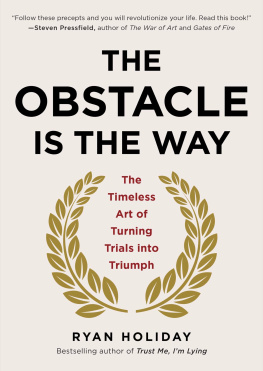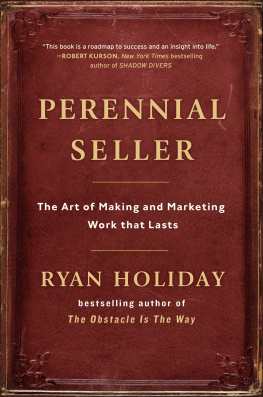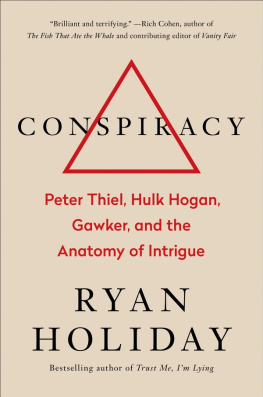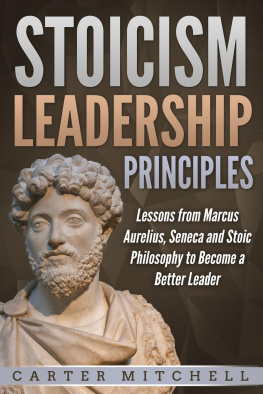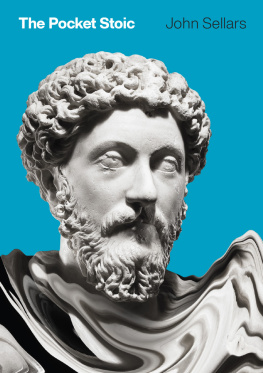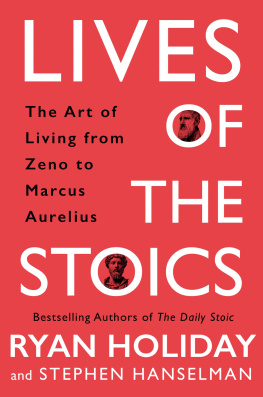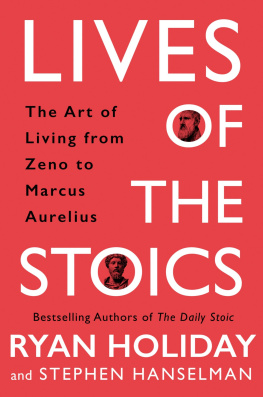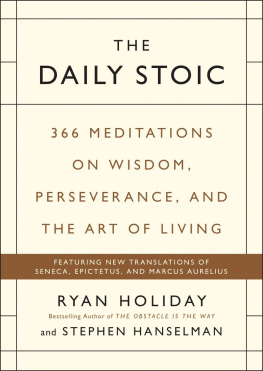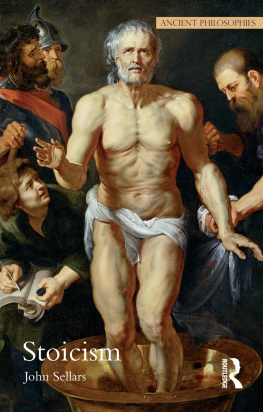PRAISE FOR THE OBSTACLE IS THE WAY
A book for the bedside of every futureand currentleader in the world.
ROBERT GREENE , author of The 48 Laws of Power and Mastery
Ryan brings philosophy out from the classroom and thrusts it back where it belongs, in our daily lives, helping anyone approaching any problem address it with equanimity and poise. A kind of users manual for life, you will turn to it time and time again and learn to tear through any obstacle and resolve any conflict. An absolute must-read.
JIMMY SONI , managing editor of The Huffington Post, author of Romes Last Citizen
First came Marcus Aurelius, then Frederick the Great... and now theres you. This surprising book shows you how to craft a life of wonder by embracing obstacles and challenge.
CHRIS GUILLEBEAU , author of The $100 Startup
In this tight, engaging book, Ryan Holiday shines a bright, powerful light on the path to living and leading well. By showing us how to turn failure, obstacles, and plain old everyday frustration to our advantage, he offers up a host of easy-to-use tactics that each of us can put to work to follow our dreams. Read it , learn from it, and get cracking!
NANCY F. KOEHN , historian and leadership expert, Harvard Business School
My life has been beset with obstacles. It takes practice (and pain) to surmount them and achieve success. Ryans book is a how-to guide for just that.
JAMES ALTUCHER , investor and author of Choose Yourself
If theres such a thing as a cargo-pocket handbook for Jedi knights, this is it. Ryan Holidays The Obstacle is the Way decants in concentrated form the timeless techniques for self-mastery as employed to world-conquering effect by philosophers and men of action from Alexander the Great to Marcus Aurelius to Steve Jobs. Follow these precepts and you will revolutionize your life. As Mr. Holiday writes, Its simple, its just not easy. Read this book!
STEVEN PRESSFIELD , author of The War of Art and Gates of Fire
Beautifully crafted. Anyone who wants to be better should read this.
KAMAL RAVIKANT author of Love Yourself Like Your Life Depends On It and Live Your Truth
Inspired by Marcus Aurelius and concepts of Stoicism, Ryan Holiday has written a brilliant and engaging book, well beyond his years, teaching us how to deal with lifes adversities and to turn negatives into positives. It is invaluable.
HONORABLE FREDERIC BLOCK , judge, U.S. District Court
Ryan Holiday teaches us how to summon our best selves. Most of us spend our lives dodging the hard stuff. Holiday exposes the tragic fallacy of this approach to living and offers us instead the philosophy of the Stoics, whose timeless lessons lead us out of fear, difficulty, and paralysis to triumph.
SHARON LEBELL , author of The Art of Living
PORTFOLIO / PENGUIN
Published by the Penguin Group
Penguin Group (USA) LLC
375 Hudson Street
New York, New York 10014

USA | Canada | UK | Ireland | Australia | New Zealand | India | South Africa | China
penguin.com
A Penguin Random House Company
First published by Portfolio / Penguin, a member of Penguin Group (USA) LLC, 2014
Copyright 2014 by Ryan Holiday
Penguin supports copyright. Copyright fuels creativity, encourages diverse voices, promotes free speech, and creates a vibrant culture. Thank you for buying an authorized edition of this book and for complying with copyright laws by not reproducing, scanning, or distributing any part of it in any form without permission. You are supporting writers and allowing Penguin to continue to publish books for every reader.
LIBRARY OF CONGRESS CATALOGING-IN-PUBLICATION DATA
Holiday, Ryan.
The obstacle is the way : the timeless art of turning trials into triumph / Ryan Holiday.
pages cm
Includes bibliographical references.
ISBN 978-1-101-62059-5
1. Motivation (Psychology) 2. Self-realization. I. Title.
BF503.H65 2014
158dc23
2013039949
Version_1
CONTENTS
PREFACE
I n the year 170, at night in his tent on the front lines of the war in Germania, Marcus Aurelius, the emperor of the Roman Empire, sat down to write. Or perhaps it was before dawn at the palace in Rome. Or he stole a few seconds to himself during the games, ignoring the carnage on the floor of the Colosseum below. The exact location is not important. What matters is that this man, known today as the last of the Five Good Emperors, sat down to write.
Not to an audience or for publication but to himself, for himself. And what he wrote is undoubtedly one of historys most effective formulas for overcoming every negative situation we may encounter in life. A formula for thriving not just in spite of whatever happens but because of it.
At that moment, he wrote only a paragraph. Only a little of it was original. Almost every thought could, in some form or another, be found in the writings of his mentors and idols. But in a scant eighty-five words Marcus Aurelius so clearly defined and articulated a timeless idea that he eclipses the great names of those who came before him: Chrysippus, Zeno, Cleanthes, Ariston, Apollonius, Junius Rusticus, Epictetus, Seneca, Musonius Rufus.
It is more than enough for us.
Our actions may be impeded... but there can be no impeding our intentions or dispositions. Because we can accommodate and adapt. The mind adapts and converts to its own purposes the obstacle to our acting.
And then he concluded with powerful words destined for maxim.
The impediment to action advances action.
What stands in the way becomes the way.
In Marcuss words is the secret to an art known as turning obstacles upside down. To act with a reverse clause, so there is always a way out or another route to get to where you need to go. So that setbacks or problems are always expected and never permanent. Making certain that what impedes us can empower us.
Coming from this particular man, these were not idle words. In his own reign of some nineteen years, he would experience nearly constant war, a horrific plague, possible infidelity, an attempt at the throne by one of his closest allies, repeated and arduous travel across the empirefrom Asia Minor to Syria, Egypt, Greece, and Austriaa rapidly depleting treasury, an incompetent and greedy stepbrother as co-emperor, and on and on and on.
And from what we know, he truly saw each and every one of these obstacles as an opportunity to practice some virtue: patience, courage, humility, resourcefulness, reason, justice, and creativity. The power he held never seemed to go to his headneither did the stress or burden. He rarely rose to excess or anger, and never to hatred or bitterness. As Matthew Arnold, the essayist, remarked in 1863, in Marcus we find a man who held the highest and most powerful station in the worldand the universal verdict of the people around him was that he proved himself worthy of it.
It turns out that the wisdom of that short passage from Marcus Aurelius can be found in others as well, men and women who followed it like he did. In fact, it is a remarkable constant down through the ages.
One can trace the thread from those days in the decline and fall of the Roman Empire to the creative outpouring of the Renaissance to the breakthroughs of the Enlightenment. Its seen starkly in the pioneer spirit of the American West, the perseverance of the Union cause during the Civil War, and in the bustle of the Industrial Revolution. It appeared again in the bravery of the leaders of the civil rights movement and stood tall in the prison camps of Vietnam. And today it surges in the DNA of the entrepreneurs of Silicon Valley.

